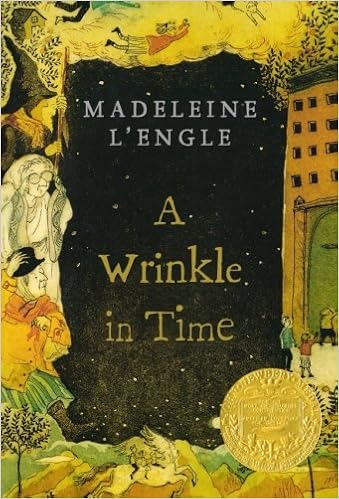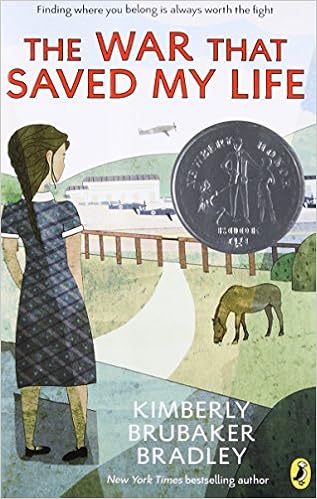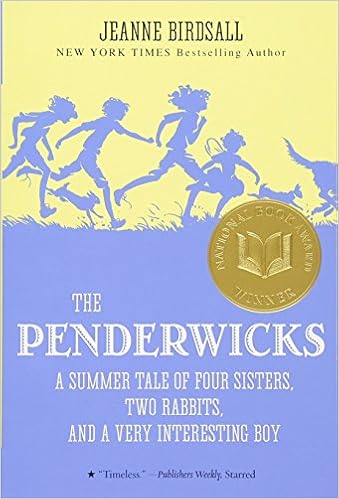See below on how to help "The Summer Slide!"
|
|
 Today we began our "Making a Difference" research project. Students will research an individual that has made a positive impact on our world. Students will research how their chosen individual has made a difference, how they inspire others, background information about the individual, and more.
Today we began our "Making a Difference" research project. Students will research an individual that has made a positive impact on our world. Students will research how their chosen individual has made a difference, how they inspire others, background information about the individual, and more.
 | A Wrinkle In Time by Madeline L'Engle (Ages 10-14, GL 6+) 1963 Newbery Medal Winner "It was a dark and stormy night." The winner of the Newbery Medal in 1963, A Wrinkle In Time is the story of the adventures in space and time of Meg, Charles Wallace, and Calvin O'Keefe. They are in search of Meg's father, a scientist who disappeared while engaged in secret work for the government. After reading the book, go see the movie that came out on Feb. 26! One of our Language Arts standards is to compare and contrast written work with visual representations of the same work! |
 | Wolf Hollow by Lauren Wolk (Ages 10-13, GL 5-8) 2017 Newbery Honor Book A young girl's kindness, compassion, and honesty overcome bullying. Growing up in the shadows cast by two world wars, Annabelle has lived a mostly quiet, steady life in her small Pennsylvania town. Until the day new student Betty Glengarry walks into her class. Betty quickly reveals herself to be cruel and manipulative, and while her bullying seems isolated at first, things quickly escalate, and reclusive World War I veteran Toby becomes a target of her attacks. While others have always seen Toby's strangeness, Annabelle knows only kindness. She will soon need to find the courage to stand as a lone voice of justice as tensions mount. |
 | The War That Saved My Life By Kinberly Brubaker Bradley (Ages 9-12, GL 4-7) 2016 Newbery Honor Book The moving story of triumph against all odds set during World War II. For fans of Counting by 7s. Nine-year-old Ada has never left her apartment. Her mother is too humiliated by Ada's twisted foot to let her outside. So when her little brother Jamie is shipped out of London to escape the war, Ada doesn't waste a minute. She sneaks out to join him. |
 | The Penderwicks by Jeanne Birdsall (Ages 8-12, GL 3-7) National Book Award Winner When the four Penderwick girls find themselves staying on a beautiful estate called Arundel for their summer ho,holidays, they can't wait to explore the wonderful, sprawling grounds. And even more wonderful is Jeffrey, son of Arundel's owner -- the perfect companion for their summer adventures. But Jeffrey's mother is less than thrilled with the Penderwick sisters and warns the new friends to stay out of trouble. Which, of course, they will. Won't they? |
![A Single Shard by [Park, Linda Sue]](https://images-na.ssl-images-amazon.com/images/I/514y0wNmUwL.jpg) | A Single Shard by Linda Sue Park (Ages 8-12, GL 3-7) 2002 Newbery Medal Winner Set in 12th Century Korea, Tree-ear, a 13-year-old orphan lives under a bridge in Ch'ulp'o, a potters' village famed for delicate celadon ware. He has become fascinated with the potter's craft; he wants nothing more than to watch master potter Min at work, and he dreams of making a pot of his own someday. When Min takes Tree-ear on as his helper, Tree-ear is elated -- until he finds obstacles in his path. But Tree-ear is determined to prove himself -- even if it means taking a long, solitary journey on foot to present Min's work in the hope of a royal commission. |
| Princess Academy by Shannon Hale (Ages 8-12, GL 3-6) Miri lives on a mountain where, for generations, her ancestors have lived a simple life. Then word comes that the king's priests have divined her village the home of the future princess. In a year's time, the prince will choose his bride from among the village girls. The king's ministers set up an academy on the mountain, and every teenage girl must attend and learn how to become a princess. Soon Miri finds herself confronted with a harsh academy mistress, bitter competition among the girls, and her own conflicting desires. Winning the contest could give her everything she ever wanted -- but it would mean leaving her home and family behind. |
 Restate, Answer, Cite, Explain! This is the BEST way to answer short constructed response questions. We reviewed this skill and discussed the importance of using our own knowledge for analysis. Feel free to review any of these skills using the review posted below!
Restate, Answer, Cite, Explain! This is the BEST way to answer short constructed response questions. We reviewed this skill and discussed the importance of using our own knowledge for analysis. Feel free to review any of these skills using the review posted below! We will be creating a Narrative Expression Project this week. Please see this document for the project guidelines, examples, and the rubric. Students will only need to work on this at home if they do not meet goals during class time. Completed projects are due at the end of class Friday, February 23 and will be presented on Monday, February 26.
We will be creating a Narrative Expression Project this week. Please see this document for the project guidelines, examples, and the rubric. Students will only need to work on this at home if they do not meet goals during class time. Completed projects are due at the end of class Friday, February 23 and will be presented on Monday, February 26. 

